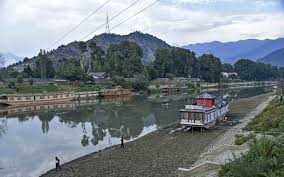
The Jhelum River, the lifeline of the Kashmir Valley, is gasping. On Wednesday, the water level at Sangam in south Kashmir’s Anantnag district dropped to an alarming 0.19 feet—its lowest for this time of year in at least five years. This disturbing benchmark is not just a statistic but a dire reflection of the twin calamities of a prolonged heat wave and an unprecedented dry spell that are currently gripping Jammu and Kashmir. The Jhelum, historically fed by snowmelt from the surrounding mountains and sustained by seasonal rains, is showing clear signs of distress. Its tributaries, too, have seen drastic reductions in flow. For us, this river is not just a source of water but a symbol of culture, economy, and survival. Agriculture, which forms the backbone of the valley’s rural economy, is heavily dependent on this river system. A low water table directly threatens paddy cultivation, fruit orchards, and other vital crops. Livelihoods are at risk, and so is our fragile ecological balance. The underlying cause—climate change—is no longer a distant concept. It is real, present, and devastating. The unusually high temperatures and lack of rainfall this summer are only the latest indicators of a larger crisis. The Himalayan region, already vulnerable due to its geography, is now bearing the brunt of erratic weather patterns. Glacial retreat, reduced snow accumulation, and unpredictable monsoons are combining to make rivers like the Jhelum increasingly unreliable. But while the natural factors are alarming, human neglect has compounded the crisis. Rampant deforestation, unregulated urbanization, pollution, and the absence of a robust water management policy have pushed Kashmir’s water resources to the brink. The failure to implement sustainable watershed and catchment area management has left the valley ill-prepared for climatic extremes. This situation demands immediate and sustained intervention. The administration must prioritize water conservation strategies, including rainwater harvesting, afforestation, and the restoration of wetlands and water bodies. Efficient irrigation techniques, such as drip irrigation, must be promoted to reduce dependence on river water. Furthermore, there must be a long-term climate resilience plan specifically tailored for the Himalayan ecosystem. The crisis on the Jhelum is not just a momentary dip in water levels—it is a warning bell. If ignored, the consequences will be devastating not only for Kashmir but for the entire Indus basin, which depends on this river system. The time to act is now. What the Jhelum needs is not sympathy, but sustained stewardship. Nature has spoken—loudly. Are we listening?
The Jhelum River, the lifeline of the Kashmir Valley, is gasping. On Wednesday, the water level at Sangam in south Kashmir’s Anantnag district dropped to an alarming 0.19 feet—its lowest for this time of year in at least five years. This disturbing benchmark is not just a statistic but a dire reflection of the twin calamities of a prolonged heat wave and an unprecedented dry spell that are currently gripping Jammu and Kashmir. The Jhelum, historically fed by snowmelt from the surrounding mountains and sustained by seasonal rains, is showing clear signs of distress. Its tributaries, too, have seen drastic reductions in flow. For us, this river is not just a source of water but a symbol of culture, economy, and survival. Agriculture, which forms the backbone of the valley’s rural economy, is heavily dependent on this river system. A low water table directly threatens paddy cultivation, fruit orchards, and other vital crops. Livelihoods are at risk, and so is our fragile ecological balance. The underlying cause—climate change—is no longer a distant concept. It is real, present, and devastating. The unusually high temperatures and lack of rainfall this summer are only the latest indicators of a larger crisis. The Himalayan region, already vulnerable due to its geography, is now bearing the brunt of erratic weather patterns. Glacial retreat, reduced snow accumulation, and unpredictable monsoons are combining to make rivers like the Jhelum increasingly unreliable. But while the natural factors are alarming, human neglect has compounded the crisis. Rampant deforestation, unregulated urbanization, pollution, and the absence of a robust water management policy have pushed Kashmir’s water resources to the brink. The failure to implement sustainable watershed and catchment area management has left the valley ill-prepared for climatic extremes. This situation demands immediate and sustained intervention. The administration must prioritize water conservation strategies, including rainwater harvesting, afforestation, and the restoration of wetlands and water bodies. Efficient irrigation techniques, such as drip irrigation, must be promoted to reduce dependence on river water. Furthermore, there must be a long-term climate resilience plan specifically tailored for the Himalayan ecosystem. The crisis on the Jhelum is not just a momentary dip in water levels—it is a warning bell. If ignored, the consequences will be devastating not only for Kashmir but for the entire Indus basin, which depends on this river system. The time to act is now. What the Jhelum needs is not sympathy, but sustained stewardship. Nature has spoken—loudly. Are we listening?
© Copyright 2023 brighterkashmir.com All Rights Reserved. Quantum Technologies